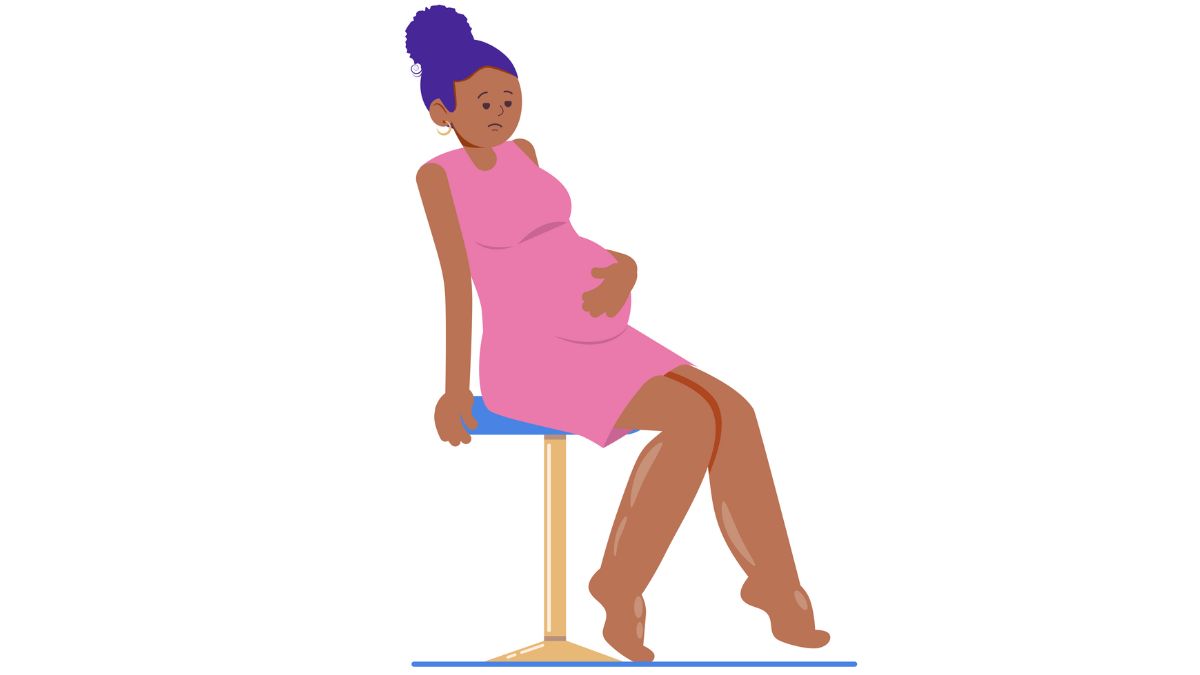Pregnancy can bring about many changes in a woman’s body, and one of the most common issues faced by expectant mothers is foot pain.
As a soon-to-be mom, it’s important to understand and manage this discomfort to ensure a healthy and happy pregnancy journey.
In this comprehensive guide, we’ll delve into the various causes of pregnancy foot pain, common types of foot pain experienced during pregnancy, and effective ways to alleviate and prevent this discomfort.
Let’s begin by understanding the root causes of foot pain during pregnancy!
Understanding Foot Pain During Pregnancy
In this section, we delve into the various factors contributing to foot pain during pregnancy, offer insights into the potential risks and complications, and provide practical advice on alleviating discomfort and caring for your feet during this special time.
Causes of Foot Pain
Several factors contribute to foot pain in pregnant women, like:
- Weight gain and increased pressure on the feet: As a woman gains weight during pregnancy, the added pressure on her feet can lead to discomfort and pain. This extra weight can also cause the foot to flatten and stretch, resulting in overpronation and potential foot problems.
- Hormonal changes and ligament laxity: During pregnancy, the body produces a hormone called relaxin, which helps to loosen the ligaments in the pelvic area to prepare for childbirth. However, relaxin can also affect the ligaments in the feet, making them more prone to injury and pain.
- Swelling and fluid retention: Swelling, also known as edema, is common during pregnancy, especially in the feet and ankles. This swelling can cause discomfort and increase the risk of developing certain foot conditions.
- Changes in posture and gait: As a woman’s center of gravity shifts due to her growing belly, her posture and gait may change, leading to increased pressure on the feet and potential foot pain.
Common Types of Foot Pain
Pregnant women may experience various types of foot pain, including:
Plantar fasciitis
This is the inflammation of the plantar fascia, a thick band of tissue that connects the heel bone to the toes.
Plantar fasciitis is characterized by a sharp, stabbing pain in the heel, particularly upon waking or after long rest periods.
Arch pain
Pain in the foot’s arch can occur due to flattening and overpronation, which can strain the muscles and ligaments supporting the arch.
Heel pain
Heel pain can be caused by plantar fasciitis and other conditions such as heel spurs or Achilles tendonitis, exacerbated by the increased pressure on the feet during pregnancy.
Ball of foot pain
Also known as metatarsalgia, this type of pain is felt in the ball of the foot and is often a result of increased pressure on the metatarsal bones.
Swollen feet and ankles
Swelling can lead to discomfort and pain, particularly if it’s severe or persistent.
Alleviating Foot Pain During Pregnancy
The good news is that numerous strategies and remedies are available to alleviate foot pain and help pregnant women stay comfortable.
This section explores various effective techniques, from simple home remedies to specialized exercises and supportive footwear, that can relieve and promote overall foot health during pregnancy.
Footwear and Support
Proper footwear and support are crucial for managing pregnancy foot pain:
- Choose proper footwear with adequate arch support: Opt for shoes that provide good arch support, cushioning, and ample room for your toes to prevent discomfort and injury.
- Use orthotic inserts or insoles: Orthotics or supportive insoles can help to redistribute pressure on the feet, reduce overpronation, and alleviate foot pain.
- Wear compression socks or stockings: Compression socks or stockings can help reduce swelling and improve circulation in the feet and ankles, relieving pain.
- Avoid high heels and unsupportive shoes: Wearing high heels or shoes with poor support can exacerbate foot pain during pregnancy. Stick to comfortable, supportive shoes whenever possible.
Home Remedies and Self-Care
Simple home remedies and self-care practices can help to alleviate foot pain during pregnancy, like:
- Regular foot exercises and stretching: Gentle exercises and stretches can help strengthen the feet’ muscles and improve flexibility, reducing the risk of injury and pain.
- Elevation and rest: Elevating your feet whenever possible and getting adequate rest can help to reduce swelling and alleviate foot pain.
- Ice or heat therapy: Applying ice packs or heating pads to the affected areas can help to soothe pain and reduce inflammation.
- Massage and foot soak: Foot massages and warm foot soaks can help relax the muscles in the feet and relieve pain.
Lifestyle Adjustments
Making certain lifestyle adjustments can help to manage foot pain during pregnancy. Here are a few great ideas!
- Manage weight gain through healthy habits: Maintaining a healthy diet and engaging in low-impact exercises, as your healthcare provider recommends, can help manage weight gain and alleviate pressure on the feet.
- Maintain proper posture and body alignment: Being mindful of your posture and body alignment can help to reduce strain on the feet and alleviate discomfort.
- Avoid prolonged standing or excessive walking: Minimizing extended standing or walking periods can help reduce pressure on the feet and prevent pain.
- Practice good hydration and balanced nutrition: Staying well-hydrated and consuming a balanced diet can help to minimize swelling and support overall foot health. Be sure to monitor salt intake and drink plenty of water!
Seek Professional Help
If foot pain persists or worsens, it’s important to seek professional help:
- Consult a healthcare provider or podiatrist: Your healthcare provider or a podiatrist can help to diagnose and treat any underlying foot conditions causing pain during pregnancy.
- Physical therapy or specialized foot care treatments: Physical therapy or specialized foot care treatments may be recommended to help manage and alleviate foot pain.
- Custom orthotics or shoe modifications: Custom orthotics or shoe modifications may sometimes be necessary to provide adequate support and alleviate foot pain during pregnancy.
How to Prevent Foot Pain During Pregnancy
Preventing foot pain during pregnancy involves taking proactive steps before and during pregnancy:
Before Pregnancy
- Strengthening foot and leg muscles: Regular exercise and stretching can help to strengthen the muscles in the feet and legs, reducing the risk of foot pain during pregnancy.
- Maintaining a healthy weight before pregnancy: Entering pregnancy at a healthy weight can help to minimize the added pressure on the feet and reduce the risk of foot pain.
- Ensuring proper footwear and support: Investing in supportive shoes and orthotics before pregnancy can help to prevent foot discomfort as your body changes.
During Pregnancy
- Regular foot care and hygiene: Maintaining good foot hygiene and care practices can help to keep your feet healthy and prevent foot pain during pregnancy.
- Gentle exercises and stretching routines: Incorporating gentle exercises and stretches into your daily routine can help strengthen the feet’ muscles and alleviate discomfort.
- Wear supportive shoes throughout pregnancy: Wearing supportive shoes can help to minimize foot pain during pregnancy.
- Manage swelling through elevation and hydration: Elevating your feet and staying well-hydrated can help to reduce swelling and alleviate pain.
When to Seek Medical Advice
It’s essential to consult with a healthcare provider if you’re experiencing severe or persistent foot pain during pregnancy.
Be aware of red flags and signs of potential complications, such as severe swelling, redness, warmth, or an inability to walk without significant pain.
Frequently Asked Questions (FAQs)
Why are my feet throbbing in pregnancy?
Increased blood volume and hormonal changes during pregnancy can cause fluid retention and swelling, leading to throbbing feet. Additionally, weight gain and changes in posture can put extra pressure on the feet, exacerbating discomfort. It’s important to rest, elevate your feet, wear comfortable shoes, and consult a healthcare provider for proper guidance and relief.
Where should you not rub your feet when pregnant?
During pregnancy, it is generally recommended to avoid certain pressure points on the feet, such as those related to reproductive organs, as they may stimulate contractions. It’s advisable to consult with a healthcare provider or a licensed prenatal massage therapist who can provide specific guidance on safe and appropriate foot massage techniques during pregnancy.
How long should a pregnant woman stand on her feet?
Pregnant women should aim to limit prolonged standing and try to find opportunities to rest and elevate their feet throughout the day. There isn’t a specific duration set in stone, as it depends on individual comfort and the stage of pregnancy. However, avoiding extended periods of standing is generally recommended to minimize discomfort and reduce the risk of swelling and fatigue. Consulting with a healthcare provider for personalized advice is always a good idea.
Is it normal to have foot pain during pregnancy?
Yes, experiencing foot pain during pregnancy is quite common. Hormonal changes, weight gain, changes in posture, and increased fluid retention can all contribute to foot discomfort. It is important to practice proper foot care, wear comfortable shoes, and seek relief through methods like rest, elevation, and gentle stretching. If the pain becomes severe or persistent, it’s advisable to consult a healthcare provider for further guidance.
When do your feet start to hurt during pregnancy?
Foot pain during pregnancy can start at different times for different women. However, it is not uncommon for foot pain to occur in the second and third trimesters as the body undergoes changes and weight gain increases. Factors like hormonal changes, increased fluid retention, and changes in posture contribute to foot discomfort. Taking proactive measures such as wearing supportive shoes, practicing regular foot stretches, and resting can help manage and alleviate the pain. I
Wrapping it Up
Understanding the causes of pregnancy foot pain and implementing appropriate measures to alleviate and prevent discomfort is crucial for expectant mothers.
You can ensure a more comfortable and enjoyable pregnancy journey by prioritizing foot health and seeking personalized guidance from healthcare professionals.
Don’t hesitate to contact your healthcare provider for foot pain relief during pregnancy and foot care tips for pregnant women.
Sources
- https://www.verywellhealth.com/pregnancy-foot-pain-1337807
- https://www.everydayhealth.com/foot-health/foot-pain-pregnancy.aspx
- https://www.mayoclinic.org/healthy-lifestyle/pregnancy-week-by-week/expert-answers/swelling-during-pregnancy/faq-20058467
- https://pubmed.ncbi.nlm.nih.gov/20132753/
- https://www.parents.com/pregnancy/my-body/aches-pains/pregnancy-leg-and-foot-pain/







